AWM41 1054 - [Nurses Narratives] Sister E Vickers Foote - Part 2
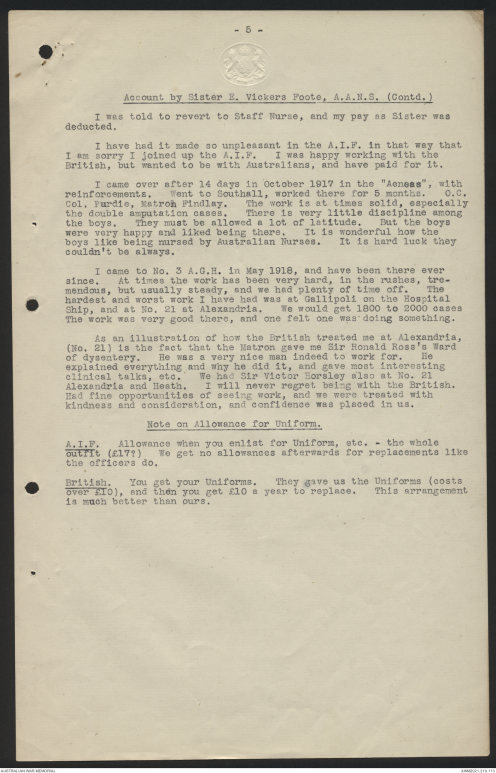
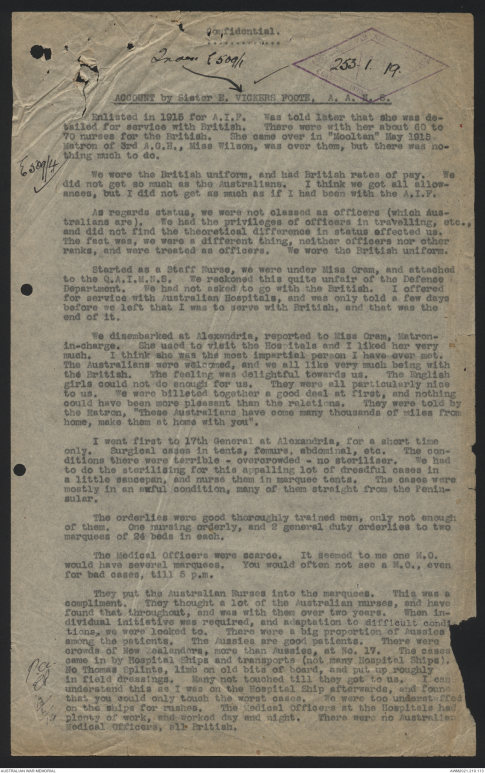
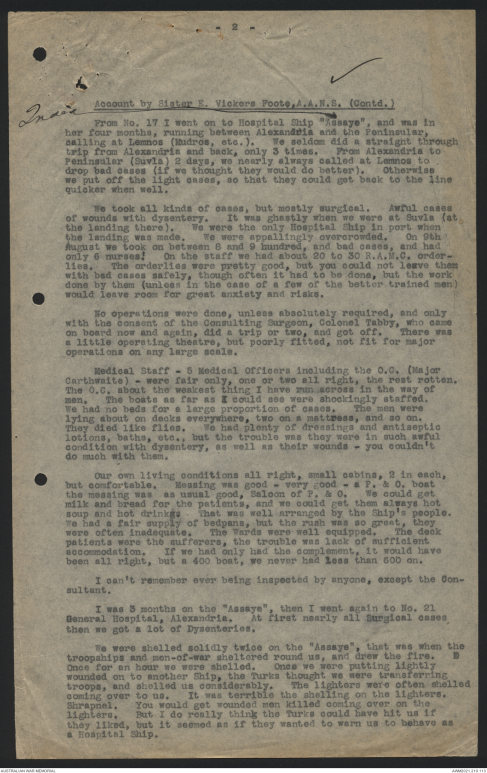
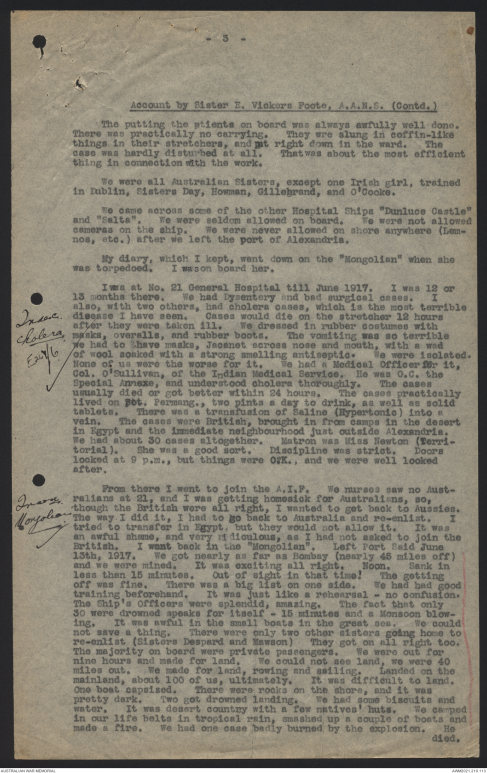
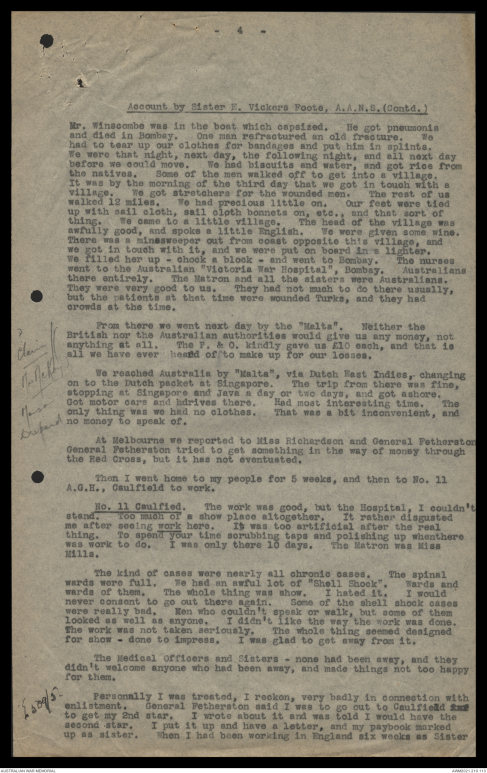
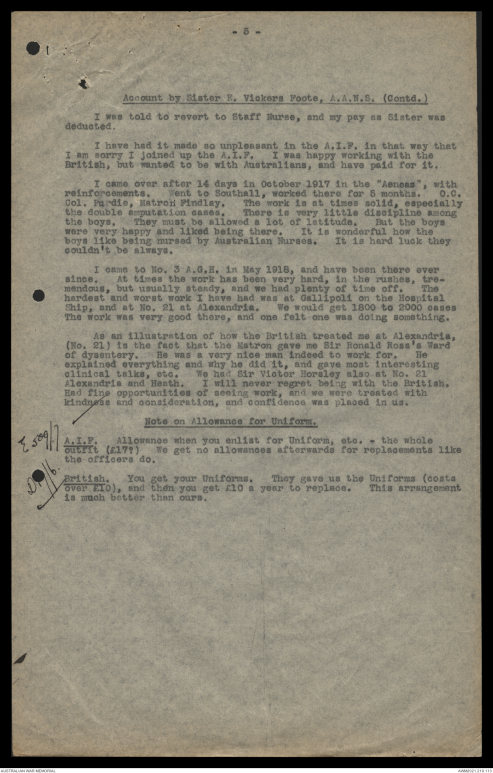
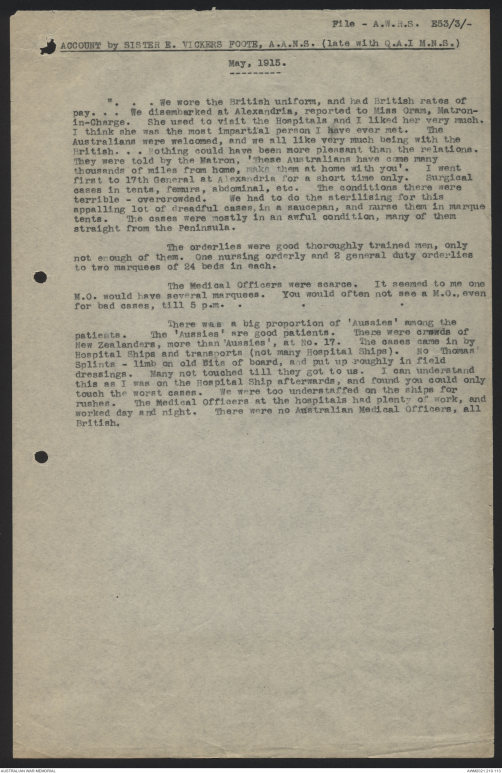
- 5 -
Account by Sister E. Vickers Foote, A. A. N. S. (Contd.)
I was told to revert to Staff Nurse, and my pay as Sister was
deducted.
I have had it made so unpleasant in the A.I.F. in that way that
I am sorry I joined up the A.I.F. I was happy working with the
British, but wanted to be with Australians, and have paid for it.
I came over after 14 days in October 1917 in the "Aeneas", with
reinforcements. Went to Southall, worked there for 5 months. O.C.
Col. Purdie, Matron Findlay. The work is at times solid, especially
the double amputation cases. There is very little discipline among
the boys. They must be allowed a lot of latitude. But the boys
were very happy and liked being there. It is wonderful how the
boys like being nursed by Australian Nurses. It is hard luck they
couldn't be always.
I came to No. 3 A.G.H. in May 1918, and we have been there ever
since. At times the work has been very hard, in the rushes, tremendous,
but usually steady, and we had plenty of time off. The
hardest and worst work I have had was at Gallipoli on the Hospital
Ship, and at No. 21 at Alexandria. We would get 1800 to 2000 cases
The work was very good there, and one felt one was doing something.
As an illustration of how the British treated me at Alexandria,
(No. 21) is the fact that the Matron gave me Sir Ronald Ross's Ward
of dysentery. He was a very nice man indeed to work for. He
explained everything and why he did it, and gave most interesting
clinical talks, etc. We had Sir Victor Horsley also at No. 21
Alexandria and Heath. I will never regret being with the British.
Had fine opportunities of seeing work, and we were treated with
kindness and consideration, and confidence was placed in us.
Note on Allowance for Uniform.
A.I.F. Allowances when you enlist for Uniform, etc. - the whole
outfit (£17?) We get no allowances afterwards for replacements like
the officers do.
British. You get your Uniforms. They gave us the Uniforms (costs
over £10), and then you get £10 a year to replace. This arrangement
is much better than ours.
Confidential.
France E509/1 253.1.19
ACCOUNT by Sister E. VICKERS FOOTE, A. A. N. S.
Enlisted in 1915 for A.I.F. Was told later that she was detailed
for service with British. There were with her about 60 to
70 nurses for the British. She came over in "Mooltan" May 1915.
Matron of 3rd A.G.H., Miss Wilson, was over them, but there was nothing
much to do.
[*E509/4*]
We wore the British uniform, and had British rates of pay. We
did not get so much as the Australians. I think we got all allowances,
but I did not get as much as if I had been with the A.I.F.
As regards status, we were not classed as officers (which Australians
are). We had the privileges of officers in travelling, etc.,
and did not find the theoretical difference in status affected us.
The fact was, we were a different thing, neither officers nor other
ranks, and were treated as officers. We wore the British uniform.
Started as a Staff Nurse, we were under Miss Oram, and attached
to the Q.A.I.M.N.S. We reckoned this quite unfair of the Defence
Department. We had not asked to go with the British. I offered
for service with Australian Hospitals, and was only told a few days
before we left that I was to serve with British, and that was the
end of it.
We disembarked at Alexandria, reported to Miss Oram, Matron-
in-charge. She used to visit the Hospitals and I liked her very
much. I think she was the most impartial person I have ever met.
The Australians were welcomed, and we all like very much being with
the British. The feeling was delightful towards us. The English
girls could not do enough for us. They were all particularly nice
to us. We were billeted together a good deal at first, and nothing
could be more pleasant than the relations. They were told by
the Matron, "These Australians have come many thousands of miles from
home, make them at home with you".
I went first to 17th General at Alexandria, for a short time
only. Surgical cases in tents, femurs, abdominal, etc. The conditions
there were terrible - overcrowded - no steriliser. We had
to do the sterilising for this appalling lot of dreadful cases in
a little saucepan, and nurse them in marquee tents. The cases were
mostly in an awful condition, many of them straight from the Peninsular.
The orderlies were good thoroughly trained men, only not enough
of them. One nursing orderly, and 2 general duty orderlies to two
marquees of 24 beds in each.
The Medical Officers were scarce. It seemed to me one M.O.
would have several marquees. You would often not see a M.O., even
for bad cases, till 5 p.m.
They put the Australian Nurses into the marquees. This was a
compliment. They thought a lot of the Australian nurses, and have
found that throughout, and was with them over two years. When individual
initiative was required, and adaptation to difficult conditions,
we were looked to. There were a big proportion of Aussies
among the patients. The Aussies are good patients. There were
crowds of New Zealanders, more than Aussies, at No. 17. The cases
came in by Hospital Ships and transports (not many Hospital Ships).
No Thomas Splints, limb on old bits of board, and put up roughly
in field dressings. Many not touched till they got to us. I can
understand this as I was on the Hospital Ship afterwards, and found
that you could only touch the worst cases. We were too understaffed
on the ships for rushes. The Medical Officers at the Hospitals had
plenty of work, and worked day and night. There were no Australian
Medical Officers, all British.
[*P.A.
CP
13/6/19*]
- 2 -
Account by Sister E. Vickers Foote, A.A.N.S. (Contd.)
From No. 17 I went on the Hospital Ship "Assays", and was in
[*India*]
her four months, running between Alexandria and the Peninsular,
calling at Lemnos (Mudros etc.). We seldom did a straight through
trip from Alexandria and back, only 3 times. From Alexandria to
Peninsular (Suvla) 2 days, we nearly always called at Lemnos to
drop bad cases (if we thought they would do better). Otherwise
we put off the light cases, so that they could get back to the line
quicker when well.
We took all kinds of cases, but mostly surgical. Awful cases
of wounds with dysentery. It was ghastly when we were at Suvla (at
the landing there). We were the only Hospital Ship in port when
the landing was made. We were appallingly overcrowded. On 9th
August we took on between 8 and 9 hundred, and bad cases, and had
only 6 nurses! On the staff we had about 20 to 30 R.A.M.C. orderlies.
The orderlies were pretty good, but you could not leave them
with bad cases safely, though often, it had to be done, but the work
done by them (unless in the case of a few of the better trained men)
would leave the room for great anxiety and risks.
No operations were done, unless absolutely required, and only
with the consent of the Consulting Surgeon, Colonel Tabby, who came
on board now and again, did a trip or two, and got off. There was
a little operating theatre, but poorly fitted, not fit for major
operations on any large scale.
Medical Staff - 5 Medical Officers including the O.C. (Major
Carthwaite) - were fair only, one or two all right, the rest rotten.
The O.C. about the weakest thing I have run across in the way of
men. The boats as far as I could see were shockingly staffed.
We had no beds for a large proportion of cases. The men were
lying about on decks everywhere, two on a mattress, and so on.
They died like flies. We had plenty of dressings and antiseptic
lotions, baths, etc., but the trouble was they were in such awful
condition with dysentery, as well as their wounds - you couldn't
do much with them.
Our own living conditions all right, small cabins, 2 in each,
but comfortable. Messing was good - very good - a P. & O. boat
the messing was as usual good, Saloon of P. & O. We could get
milk and bread for the patients, and we could get them always hot
soup and hot drinks. That was well arranged by the Ship's people.
We had a fair supply of bedpans, but the rush was so great, they
were often inadequate. The Wards were well equipped. The deck
patients were the sufferers, the trouble was lack of sufficient
accommodation. If we only had the complement, it would have
been all right, but a 400 boat, we never had less than 600 on.
I can't remember ever being inspected by anyone, except the Consultant.
I was 3 months on the "Assaye", then I went again to No. 21
General Hospital, Alexandria. At first nearly all Surgical cases,
then we got a lot of Dysenteries.
We were shelled solidly twice on the "Assaye", that was when the
troopships and men-of-war sheltered round us, and drew the fire. O
Once for an hour we were shelled. Once we were putting lightly
wounded on to another Ship, the Turks thought we were transferring
troops, and shelled us considerably. The lighters were often shelled
coming over to us. It was terrible the shelling on the lighters.
Shrapnel. You would get wounded men killed coming over on the
lighters. But I do really think the Turks could have hit us if
they liked, but it seemed as if they wanted to warn us to behave as
a Hospital Ship.
- 3 -
Account by Sister E. Vickers Foote, A.A.N.S. (Contd.)
The putting the patients on board was awfully well done.
There was practically no carrying. They are slung in coffin-like
things in their stretchers, and put right down in the ward. The
case was hardly disturbed at all. That was about the most efficient
thing in connection with the work.
We were all Australian Sisters, except one Irish girl, trained
in Dublin, Sisters Day, Howman, Gillebrand, and O'Cooke.
We came across some of the other Hospital Ships "Dunluce Castle"
and "Salta". We were seldom allowed on board. We were not allowed
cameras on the ship. We were never allowed on shore anywhere (Lemnos,
etc.) after we left port of Alexandria.
My diary, which I kept, went down on the "Mongolian" when she
was torpedoed. I was on board her.
I was at No. 21 Hospital till June 1917. I was 12 or
13 months there. We had Dysentery and bad surgical cases. I
also, with two others, had cholera cases, which is the most terrible
disease I have seen. Cases would die on the stretcher 12 hours
after they were taken ill. We dressed in rubber costumes with
masks, overalls, and rubber boots. The vomiting was so terrible
we had to have masks, Jacanet across the nose and mouth, with a wad
of wool soaked with a strong smelling antiseptic. We were isolated.
None of us were the worse for it. We had a Medical Officer for it,
[*India
cholera
E267/6*]
Col. O'Sullivan, of the Indian Medical Service. He was O.C. the
Special Annexe, and understood cholera thoroughly. The cases
usually died or got better within 24 hours. The cases practically
lived on Pot. Permang., two pints a day to drink, as well as solid
tablets. There was a transfusion of Saline (Hypertonic) into a
vein. The cases were British, brought in from the camps in the desert
in Egypt and the immediate neighbourhood just outside Alexandria.
We had about 30 cases altogether. Matron was Miss Newton (Territorial).
She was a good sort. Discipline was strict. Doors
locked up at 9 p.m., but things were O.K., and we were well looked
after.
From there I went to join the A.I.F. We nurses saw no Australians
at 21, and I was getting homesick for Australians, so,
though the British were all right, I wanted to get back to Aussies.
[*Query
Mongolian*]
The way I did it, I had to go back to Australia and re-enlist. I
tried to transfer to Egypt, but they would not allow it. It was
an awful shame, and very ridiculous, as I had not asked to join the
British. I went back in the "Mongolian". Left Port Said June
13th, 1917. We got nearly as far as Bombay (nearly 45 miles off)
and we were mined. It was exciting all right. Noon. Sank in
less than 15 minutes. out of sight in that time! The getting
off was fine. There was a big list on one side. We had had good
training beforehand. It was just like rehearsal - no confusion.
The Ship's Officers were splendid, amazing. The fact that only
30 were drowned speaks for itself - 15 minutes and a Monsoon blowing.
It was awful in the small boats in the great sea. We could
not save a thing. There were only two sisters going home to
re-enlist (Sisters Despard and Mawson) They got on all right too.
The majority on board were private passengers. We were out for
nine hours and made for land. We could not see land, we were 40
miles out. We made for land, rowing and sailing. Landed on the
mainland, about 100 of us, ultimately. It was difficult to land.
One boat capsized. There were rocks on the shore, and it was
pretty dark. Two got drowned landing. We had some biscuits and
water. It was desert country with a few natives' huts. We camped
in our life belts in tropical rain, smashed up a couple of boats and
made a fire. We had one case badly burned by the explosion. He
died.
- 4 -
Account by Sister E. Vickers Foote, A.A.N.S. (Contd.)
Mr. Winscombe was in the boat that capsized. He got pneumonia
and died in Bombay. One man refractured an old fracture. We
had to tear up our clothes for bandages and put him in splints.
We were that night, next day, the following night, and all next day
before were could move. We had biscuits and water, and got rice from
the natives. Some of the men walked off to get into a village.
It was by the next morning of the third day that we got in touch with a
village. We got stretchers for the wounded men. The rest of us
walked 12 miles. We had precious little on. Our feet were tied
up with sail cloth, sail cloth bonnets on, etc., and that sort of
thing. We came to a little village. The head of the village was
awfully good, and spoke a little English. We were given some wine.
There was a minesweeper out from coast opposite this village, and
we got in touch with it, and we were put on board in a lighter.
We filled her up - chock a block - and went to Bombay. The nurses
went to the Australian "Victoria War Hospital", Bombay. Australians
there entirely. The Matron and all the sisters were Australians.
They were very good to us. They had not much to do there usually,
but the patients at the time were wounded Turks, and they had
crowds at a time.
[*?
Claim
Rafferty
Mawson
Despard*]
From there we went next day by the "Malta". Neither the
British nor the Australian authorities would give us any money, not
anything at all. The P. & O. kindly gave us £10 each, and that is
all we have ever heard of to make up for our losses.
We reached Australia by "Malta", via Dutch East Indies, changing
on to the Dutch packet at Singapore. The trip from there was fine,
stopping at Singapore and Java a day or two days, and got ashore.
Got motor cars and hdrives there. Had most interesting time. The
only thing was we had no clothes. That was a bit inconvenient, and
no money to speak of.
At Melbourne we reported to Miss Richardson and General Fetherston.
General Fetherston tried to get something in the way of money through
the Red Cross, but it has not eventuated.
Then I went home to my people for 5 weeks, and then to No. 11
A.G.H., Caulfield to work.
No. 11 Caulfield. The work was good, but the Hospital, I couldn't
stand. Too much of a show place altogether. It rather disgusted
me after seeing work here. It was too artificial after the real
thing. To spend your time scrubbing taps and polishing whenthere
was work to do. I was only there 10 days. The Matron was Miss
Mills.
The kind of cases were nearly all chronic cases. The spinal
wards were full. We had an awful lot of "Shell Shock". Wards and
wards of them. The whole thing was show. I hated it. I would
never consent to go out there again. Some of the shell shock cases
were really bad. Men who couldn't speak or walk, but some of them
looked as well as anyone. I didn't like the way the work was done.
The work was not taken seriously. The whole thing seemed designed
for show - done to impress. I was glad to get away from it.
The Medical Officers and Sisters - none had been away, and they
didn't welcome anyone who had been away, and made things not too happy
for them.
[*E509/5*]
Personally I was treated, I reckon, very badly in connection with
enlistment. General Fetherston said I was to go out to Caulfield 2nd
to get my 2nd star. I wrote about it and was told I would have the
second star. I put it up and have a letter, and my paybook marked
up as sister. When I had been working in England six weeks as Sister
- 5 -
Account by Sister E. Vickers Foote, A. A. N. S. (Contd.
I was told to revert to Staff Nurse, and my pay as Sister was
deducted.
I have had it made so unpleasant in the A.I.F. in that way that
I am sorry I joined up the A.I.F. I was happy working with the
British, but wanted to be with Australians, and have paid for it.
I came over after 14 days in October 1917 in the "Aeneas", with
reinforcements. Went to Southall, worked there for 5 months. O.C.
Col. Purdie, Matron Findlay. The work is at times solid, especially
the double amputation cases. There is very little discipline among
the boys. They must be allowed a lot of latitude. But the boys
were very happy and liked being there. It is wonderful how the
boys like being nursed by Australian Nurses. It is had luck they
couldn't be always.
I came to No 3 A.G.H. in May 1918, and we have been there ever
since. At times the work has been very hard, in the rushes, tremendous,
but usually steady, and we had plenty of time off. The
hardest and worst work I have had was at Gallipoli on the Hospital
Ship, and at No. 21 at Alexandria. We would get 1800 to 2000 cases
The work was very good there, and one felt one was doing something.
As an illustration of how the British treated me at Alexandria,
(No. 21) is the fact that the Matron gave me Sir Ronald Ross's Ward
of dysentery. He was a very nice man indeed to work for. He
explained everything and why he did it, and gave most interesting
clinical talks, etc. We had Sir Victor Horsley also at No. 21
Alexandria and Heath. I will never regret being with the British.
Had fine opportunities of seeing work, and we were treated with
kindness and consideration, and confidence was placed in us.
Note on Allowance for Uniform.
[*E 509/7*]
A.I.F. Allowances when you enlist for Uniform, etc. - the whole
outfit (£17?) We get no allowances afterwards for replacements like
the officers do.
[*[[?]]/6*]
British. You get your Uniforms. They gave us the Uniforms (costs
over £10), and then you get £10 a year to replace. This arrangement
is much better than ours.
File - A.A.N.S. E 53/3/-
ACCOUNT by SISTER E. VICKERS FOOTE, A.A.N.S. (late with Q.A.I M.N.S.)
May, 1915.
". . . We wore the British uniform, and had British rates of
pay. . . We disembarked at Alexandria, reported to Miss Oram, Matron -
In-Charge. She used to visit the Hospitals and I liked her very much.
I think she was the most impartial person I have ever met. The
Australians were welcomed, and we all like very much being with the
British. . .Nothing could have been more pleasant than the relations.
They were told by the Matron, 'These Australians have come many
thousands of miles from home, make them at home with you'. I went
first to 17the General at Alexandria for a short time only. Surgical
cases in tents, femurs, abdominal, etc. The conditions there were
terrible - overcrowded. We had to do the sterilising for this
appalling lot of dreadful cases in a saucepan, and nurse them in marque
tents. The cases were mostly in an awful condition, many of them
straight from the Peninsula.
The orderlies were good thoroughly trained men, only
not enough of them. One nursing orderly, and 2 general duty orderlies
to two marquees of 24 beds in each.
The Medical Officers were scarce. It seemed to me one
M.O. would have several marquees. You would often not see a M.O., even
for bad cases, till 5 p.m.
There were a big proportion of Aussies among the
patients. The 'Aussies' are good patients. There were crowds of
New Zealanders, more than 'Aussies', at No. 17. The cases came in by
Hospital Ships and transports (not many Hospital Ships). No Thomas
Splints - limb on old bits of board, and put up roughly in field
dressings. Many not touched till they got to us. I can understand
this as I was on the Hospital Ship afterwards, and found you could only
touch the worst cases. We were too understaffed on the ships for
rushes. The Medical Officers at the hospitals had plenty of work, and
worked day and night. There were no Australian Medical Officers, all
British.
 Sam scott
Sam scottThis transcription item is now locked to you for editing. To release the lock either Save your changes or Cancel.
This lock will be automatically released after 60 minutes of inactivity.